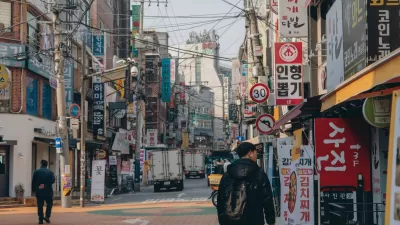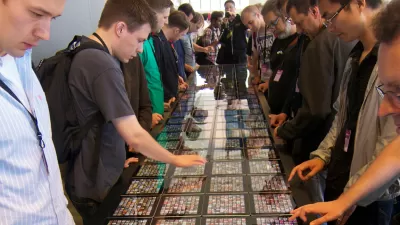Eric Jaffe reports, “[a] recent field test in Mexico offers the first experimental evidence that basic infrastructure upgrades — in this case paving streets — have a measurable effect on reducing urban poverty.”
A street paving pilot project carried out in Acayucan, Mexico, shows a promising, and relatively low cost path for improving life in the developing world. Published in September, the results of a study [PDF] conducted by Marco Gonzalez-Navarro of the University of Toronto and Climent Quintana-Domeque of Universitat d'Alacant showed that simple street paving led to, "a substantial reduction in material poverty."
"Pavement projects boosted housing wealth, which boosted credit use, which boosted household consumption - all for a relatively low cost," writes Jaffe. These findings are based on a comparison of surveys carried out amongst households in communities in 2006, before paving was finished, then conducted again later in 2009. Factors taken into account included monthly expenditures on household items and durable goods, as well as credit usage, loan acquisitions, and changing property values.
"The researchers believe this newfound wealth, tied closely to credit use, was the result of increased home values created by the street surfacing," says Jaffe. "Professional appraisers found that properties along the paved streets rose 16 percent (with land values climbing 54 percent), compared to those on unpaved streets. Rents were 31 percent higher on paved streets, and while there weren't enough home sales to create statistical significance, the trend was clearly toward higher prices - with paved homes going for 85 percent more than their unpaved counterparts."
FULL STORY: A Simple Way to Reduce Urban Poverty: Pave Streets

Planetizen Federal Action Tracker
A weekly monitor of how Trump’s orders and actions are impacting planners and planning in America.

Chicago’s Ghost Rails
Just beneath the surface of the modern city lie the remnants of its expansive early 20th-century streetcar system.

San Antonio and Austin are Fusing Into one Massive Megaregion
The region spanning the two central Texas cities is growing fast, posing challenges for local infrastructure and water supplies.

Since Zion's Shuttles Went Electric “The Smog is Gone”
Visitors to Zion National Park can enjoy the canyon via the nation’s first fully electric park shuttle system.

Trump Distributing DOT Safety Funds at 1/10 Rate of Biden
Funds for Safe Streets and other transportation safety and equity programs are being held up by administrative reviews and conflicts with the Trump administration’s priorities.

German Cities Subsidize Taxis for Women Amid Wave of Violence
Free or low-cost taxi rides can help women navigate cities more safely, but critics say the programs don't address the root causes of violence against women.
Urban Design for Planners 1: Software Tools
This six-course series explores essential urban design concepts using open source software and equips planners with the tools they need to participate fully in the urban design process.
Planning for Universal Design
Learn the tools for implementing Universal Design in planning regulations.
planning NEXT
Appalachian Highlands Housing Partners
Mpact (founded as Rail~Volution)
City of Camden Redevelopment Agency
City of Astoria
City of Portland
City of Laramie




























